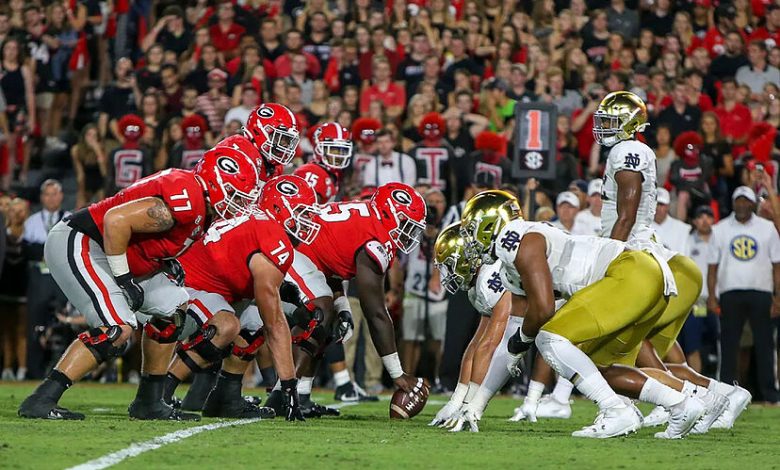Why Notre Dame emerges as biggest winner under new CFB Playoff format

College football is entering a bold new era. The College Football Playoff (CFP) format, which revolutionized the sport in 2014 by introducing a four-team playoff to decide the national champion, is evolving once again. Starting with the 2024 season, the CFP is expanding to a 12-team playoff format. This change promises to reshape the competitive landscape of college football and redefine what it means to compete for a national title.
Among the many teams poised to benefit from this expansion, Notre Dame stands out as the biggest winner under the new CFP format. The Fighting Irish, an independent football powerhouse with a storied history and national following, are uniquely positioned to capitalize on this change. This article delves deep into why Notre Dame emerges as the clear frontrunner to gain the most from the new playoff system, exploring the strategic, structural, and competitive advantages the new format offers to the Irish.
Before unpacking Notre Dame’s advantages, it’s important to understand the basics of the new playoff structure. The 12-team CFP model includes:
- Automatic bids for all Power Five conference champions.
- Four at-large bids awarded to the highest-ranked teams regardless of conference.
- Top four seeds receive first-round byes.
- Remaining eight teams play in the first round, with winners advancing to the quarterfinals.
This model vastly expands the pool of contenders, reduces the impact of a single loss, and offers more opportunities for teams outside the traditional Power Five to participate. But while many teams stand to benefit, Notre Dame’s unique status as an independent football program with strong national brand recognition and scheduling flexibility makes them the primary beneficiary.
Unlike most top-tier college football programs, Notre Dame operates as an independent in football, not belonging to any conference. This independence historically has been a double-edged sword. Without a conference championship game, the Fighting Irish have often faced challenges securing playoff bids, especially in years when the CFP committee favored conference champions or teams from Power Five leagues.
Under the old four-team system, Notre Dame’s path to the playoff was narrow—usually requiring an undefeated or near-perfect season coupled with impressive wins over ranked opponents. The lack of a conference title game left them vulnerable to being edged out by teams with conference championships.
With the new 12-team format, Notre Dame’s independent status transforms from a liability into a significant advantage:
- No Need to Win a Conference Title to Secure a Playoff Spot:
The new system guarantees playoff spots to all Power Five conference champions, but the four at-large spots remain highly contested. Notre Dame, with a national schedule and strong strength of schedule, is a prime candidate for these at-large bids. They can bypass the uncertainty of conference races and still earn a top-tier playoff berth. - Scheduling Flexibility to Build a Strong Resume:
Notre Dame’s independence allows them to strategically schedule high-profile opponents from various conferences, enhancing their strength of schedule and national profile. This is critical under the CFP committee’s criteria, which heavily weigh quality wins and schedule difficulty. In the new expanded format, Notre Dame can craft a schedule that optimizes their playoff chances without the constraints of conference scheduling. - Avoiding Conference Injuries and Upsets:
Conference championship games and tough conference schedules often lead to upsets or injuries that derail teams. Notre Dame’s more controlled schedule reduces this risk, allowing them to maintain consistency and peak at playoff time.
Notre Dame is more than just a football program—it’s a cultural institution with nationwide appeal. The Fighting Irish enjoy unparalleled media exposure, lucrative TV contracts, and a fan base that spans the country. This brand strength translates into several concrete advantages under the new CFP format:
- Higher Media Visibility:
Notre Dame’s games attract millions of viewers, which incentivizes the CFP committee and broadcasters to include them in the playoff to maximize audience interest and revenue. The 12-team format provides room for marquee teams with large followings, making Notre Dame a natural inclusion even if they don’t win every game. - Recruiting Advantages:
The promise of playoff participation, national exposure, and playing on the biggest stages attracts top recruits. The expanded playoff guarantees more postseason opportunities for Notre Dame players, strengthening the program’s ability to compete for elite talent year after year. - Boost to Scheduling Power:
With the expanded playoff, other teams and conferences are more willing to schedule Notre Dame in non-conference matchups, knowing the Irish are likely playoff contenders. This further enhances Notre Dame’s strength of schedule and resume.
Under the four-team CFP system, one bad loss could derail a team’s entire season. The narrow margin for error often worked against Notre Dame, especially with the unpredictability of their independent schedule.
The 12-team format eases this pressure in several ways:
- More Room for Imperfect Seasons:
Teams can afford one or two losses and still make the playoff, especially if those losses come against strong opponents. This flexibility benefits Notre Dame, which often faces tough matchups on the road and can sometimes stumble early in the season. - First-Round Bye Incentive:
If Notre Dame can secure a top-four seed based on their season performance, they earn a bye week, giving them additional rest and preparation time. The Irish have the talent and coaching acumen to reach this tier regularly. - Opportunities for Revenge and Momentum:
The expanded playoff can feature rematches and cross-conference games that give Notre Dame chances to avenge regular-season losses or capitalize on momentum late in the year. This dynamic could play to the strengths of Coach Marcus Freeman’s squad, who thrive under pressure and adaptability.
While the new playoff expands opportunities, it also highlights structural disadvantages for many Power Five teams:
- Conference Championship Overload:
Many Power Five conferences require grueling schedules and championship games that increase injury risk and fatigue. Notre Dame’s lighter, more controlled schedule reduces these risks. - Potential for Conference Chaos:
The guarantee of conference champion spots can lock in weaker teams if the conference is deep but lacks clear dominant teams. Notre Dame, as an at-large candidate, can leapfrog such teams by compiling quality wins. - Geographic and Media Market Considerations:
Some conferences are more regional with less national reach. Notre Dame’s broad appeal gives them an edge in CFP committee decisions, which consider marketability and national interest.
Notre Dame’s coaching staff and institutional stability further enhance their status as big winners under the new format:
- Marcus Freeman’s Vision:
The young, energetic head coach is revitalizing the program with innovative strategies and a strong player culture. Freeman’s leadership positions Notre Dame to consistently contend at a high level. - Institutional Support and Facilities:
Notre Dame invests heavily in football, ensuring players have access to top-tier training, medical, and academic support. This infrastructure supports sustained competitiveness, a must in a longer playoff system. - Player Development:
The program’s emphasis on holistic development prepares athletes to excel both on and off the field, translating to disciplined, focused teams capable of deep playoff runs
Notre Dame’s emergence as the biggest winner under the new CFP format could have lasting ripple effects across college football:
- Reaffirmation of Independence:
Success in the playoff without a conference may inspire other programs to consider independence or alternative affiliations. - Scheduling Trends:
Teams may seek to emulate Notre Dame’s scheduling strategy, prioritizing quality non-conference matchups and national exposure. - Media and Revenue Growth:
Notre Dame’s participation in the expanded playoff can drive TV ratings, sponsorship deals, and fan engagement, benefiting the sport financially and culturally. - Shifts in Recruiting Landscapes:
More playoff exposure for Notre Dame could influence recruiting battles, challenging traditional Power Five pipelines and creating a more competitive recruiting environment nationally.
The expansion of the College Football Playoff to 12 teams is a watershed moment for the sport, democratizing access and reshaping how champions are crowned. In this new era, Notre Dame stands out as the biggest winner, thanks to its independent status, national brand, scheduling flexibility, and institutional strength.
No longer constrained by the limits of a four-team playoff and the absence of a conference championship, Notre Dame can leverage the new format to consistently compete for national titles. The Fighting Irish’s unique blend of tradition, innovation, and adaptability positions them to thrive in the playoff’s expanded field.
As college football’s landscape evolves, Notre Dame’s rise signals a new chapter—one where independence and strategic vision can carve a path to glory on the sport’s biggest stage.
Would you like me to add quotes, historical context, or specific recent examples to enrich this article?









